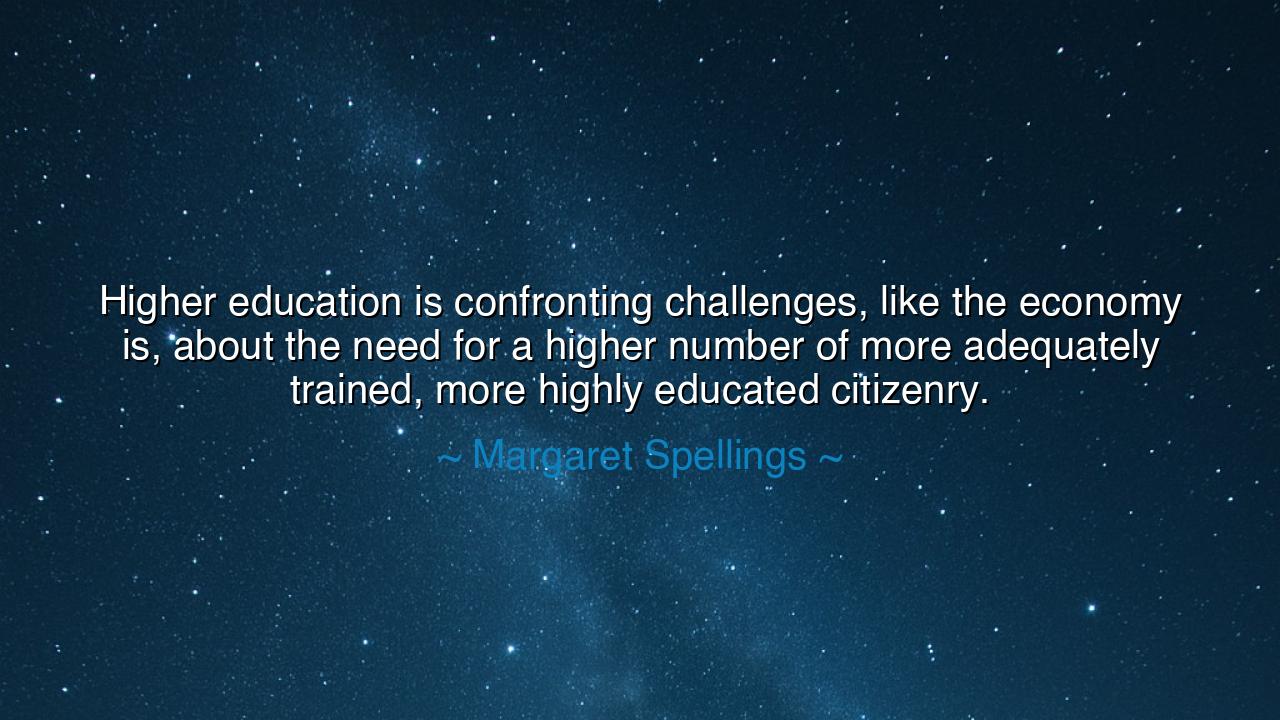
Higher education is confronting challenges, like the economy is
Higher education is confronting challenges, like the economy is, about the need for a higher number of more adequately trained, more highly educated citizenry.






The words of Margaret Spellings — “Higher education is confronting challenges, like the economy is, about the need for a higher number of more adequately trained, more highly educated citizenry” — carry the weight of both prophecy and warning. They remind us that the strength of a nation lies not merely in its armies or its wealth, but in the wisdom, skill, and education of its people. Spellings, a former U.S. Secretary of Education, spoke in an age where both the economy and education were transforming at great speed, and her message burns even brighter in our time: that survival and prosperity depend not only on progress, but on prepared minds capable of guiding that progress wisely.
In the ancient world, the philosopher-king of Plato’s imagination understood this truth well. Plato taught that a city cannot flourish if its rulers are ignorant, nor can its citizens prosper if they are untrained in the art of reason. A society of thinkers is a society of builders — builders not of stone alone, but of justice, innovation, and culture. Higher education, in this sense, is not merely the pursuit of degrees but the cultivation of civilization itself. When Spellings speaks of the need for a “more adequately trained, more highly educated citizenry,” she calls us back to this eternal truth: that education is the foundation upon which economies stand and the shield that protects nations from decay.
Her words also reveal a tension familiar to every age of transition. Just as economies must adapt to new technologies, so too must schools and universities evolve to meet the demands of a changing world. When the industrial age dawned, it demanded craftsmen who understood machines; today, the digital age demands minds that understand complexity, creativity, and ethics. The challenges of higher education mirror the struggles of the economy — both must balance speed with depth, innovation with wisdom, and efficiency with humanity. Without such balance, both collapse: one into recession, the other into ignorance.
We can see this truth reflected in history’s great transformations. In the aftermath of World War II, the GI Bill in the United States opened the doors of higher learning to millions of veterans. It was a bold act of faith — faith that education could rebuild a nation. And it did. That generation, trained in science, engineering, and the humanities, went on to create the infrastructure, industries, and institutions that shaped the modern world. From the laboratories that birthed the space age to the classrooms that nurtured civil rights, the power of an educated citizenry turned hardship into progress. Spellings’ insight flows from this legacy: that education is the engine that drives not only economies, but destinies.
Yet she also warns us: numbers alone are not enough. To educate more people is noble, but to educate them well is divine work. A society can produce graduates in abundance, yet still fail if they emerge unprepared for the challenges of real life — if they possess knowledge without wisdom, skill without integrity. True higher education must train not only the hand and the mind, but also the conscience. It must shape citizens who can think critically, act justly, and serve compassionately. Without this, education becomes an assembly line rather than a forge of souls.
The economy, too, depends upon this higher calling. Machines can perform tasks, but only educated hearts and disciplined minds can create visions. In an era where automation threatens labor and misinformation clouds truth, the world needs not just workers, but leaders — individuals who can guide technology with ethics, interpret data with discernment, and unite knowledge with wisdom. Spellings saw this coming, and her words are a torch for those navigating the dark forests of uncertainty: if education fails, the economy follows; if the mind decays, so too does the nation.
Let this, then, be the lesson: the prosperity of any people rests on the education of its citizens, and that education must be living, evolving, and moral. Every generation must renew its covenant with knowledge — to learn not for vanity, but for service; not for competition, but for contribution. Build schools not of walls, but of vision. Train minds not to memorize, but to question. Teach hands not just to work, but to create. For as the ancients said, “The mind is not a vessel to be filled, but a fire to be kindled.”
Thus, Margaret Spellings reminds us of our sacred duty: to kindle that fire in all people — that our higher education may lift both spirit and society, and that our citizenry, strong in wisdom and skill, may lead humanity toward a future worthy of its potential.






AAdministratorAdministrator
Welcome, honored guests. Please leave a comment, we will respond soon